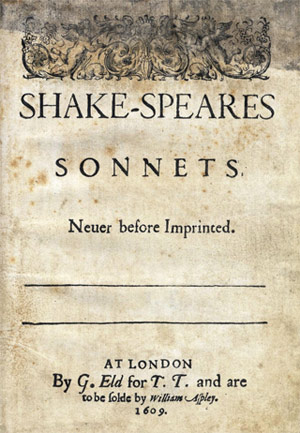Sonnet LX:

BASIC FACTS:
Title: Sonnet LX.
Author: William Shakespeare.
Date of composition: 1590s.
Date of publication: 1609. Shakespeare’s sonnets were first published by Thomas Thorpe without the consent of the author.
Collection: Sonnets.
Poetic genre: Sonnet.
Metric: Poem composed according to the English or Shakespearean sonnet scheme: 14 iambic pentameters divided into three quatrains and a final couplet.
Rhyme: The rhyme pattern is the following: ABAB CDCD EFEF GG.
FURTHER INFORMATION:
Major Themes:
The major theme of this sonnet is time; Shakespeare explores the paradox of time in his sonnets. Death, beauty and love are also themes here but all of them are subordinated to time.
Symbols:
Waves (l.1), together with the parallels (wrinkles) (l.10) represent the passage of time; wrinkles are also an image of the loss of beauty associated with becoming old.
Each changing place with that which goes before,
In sequent toil all forwards do contend. (l. 3 and 4)
These verses represent the inexorability of time.
And nothing stands but for his scythe to mow. (l.12)
Praising thy worth, despite his cruel hand. (l.14)
In these verses we observe a traditional representation of death, with the scythe and as a cruel creature. Shakespeare identifies death with time.
My verse shall stand. (l.13)
Literature appears as a minor form of immortality, a way to make the beauty of the beloved last forever.
Literary devices:
- Alliteration:
Crooked eclipses 'gainst his glory fight, (l.7)
And delves the parallels in beauty's brow, (l.10)
- Anaphora:
 And Time that gave doth now his gift confound. (l.8)
And Time that gave doth now his gift confound. (l.8)
Time doth transfix the flourish set on youth (l.9)
And nothing stands but for his scythe to mow: (l.12)
And yet to times in hope my verse shall stand, (l.13)
- Personification:
Time appears personified in verses 8 to 14:
And Time that gave doth now his gift confound.
Time doth transfix the flourish set on youth
And delves the parallels in beauty's brow,
Feeds on the rarities of nature's truth,
And nothing stands but for his scythe to mow:
And yet to times in hope my verse shall stand,
Praising thy worth, despite his cruel hand.
The poetry, named “verse” here is personified in line 13
And yet to times in hope my verse shall stand,
- Simile:
Like as the waves make towards the pebbled shore, (l.1)
So do our minutes hasten to their end; (l.2)
Shakespeare compares the waves that go to die against the rocks of the shore with the minutes of life that are brief and start and end, one after another.



